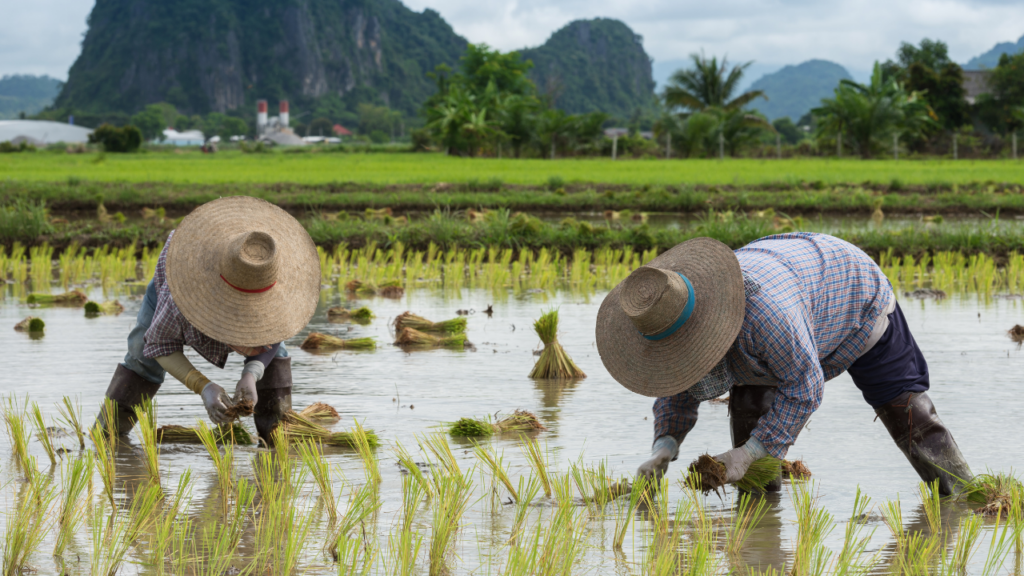Cebu farmers want the gov’t to strengthen support on agri sector

Farmers working on rice field. | Inquirer File Photo
CEBU CITY, Philippines — Farmers in Cebu said the newly mandated price ceiling on rice has a huge impact on them.
Under Executive Order No. 39 of President Ferdinand “Bongbong” Marcos Jr., the regular-milled rice is at P41 per kilo while the well-milled rice is at P45 per kilo.
READ: ‘Half-rice’ ordinance revived in Cebu City
Prices of palay dipped
Nick Abasolo, chairman of Kilusang Magbubukid ng Pilipinas (KMP) Cebu Chapter said the price of rice grains (palay) should have been higher in these times.
“Karon kay iya naman pong gipaubusan ang presyo sa bugas, syempre, moubos ang presyo sa palay,” he said.
(Now that you have lowered the price of rice, of course, the price of palay will also lower.)
However, he said the problem here were the prices of the pesticides and fertilizers which were still high.
READ: 92 south Cebu rice farmers receive Fertilizer Discount Voucher from DA-7
Prices of fertilizers, pesticides go up
“Ang abuno (fertilizer) padayong nagtaas, ang pestisidyo padayong nagtaas, unya ang binhi padayong nagtaas, so kinsa may nagsakripisyo aning price ceiling ni (President) Bongbong Marcos? Kaming mga mag u-uma, ang among sektor,” he said.
(The price of fertilizer has continued to increase, the the price pesticide has continued to increase, and the price of palay has also continued to increase, so who will suffer in this price ceiling of (President) Bongbong Marcos? We, the farmers, our sector.)
On the other hand, he said KMP-Cebu believed that the solution to address the rising prices of rice would be to develop and improve the agricultural sector of the country.
READ: Imee Marcos: Local farmers first before importing rice
Agrarian reform
“Pero ang gihimo sa gobyerno, [unta] iyang suportahan, ipatuman ang tinuod nga repormang agraryo, hatagan niya’g budget or subsidy ang mga mag u-uma [apan] iyang gihimo kay importasyon,” he said.
(But what the government [should do] is to support, implement the true agrarian reform, give a budget or subsidy to the farmers [but] what he did was to import.)
He added that was also the reason why the prices of rice had increased within a short period of time.
“Pero ang gihimo ni Bongbong Marcos, naghimo siya’g price ceiling. Para namo, ang gihimo ni Bongbong Marcos (kay) usa ka band aid solution. Bilang sekretaryo (sa Department of Agriculture), wa tingali sa iyahang pangandoy nga tubagon ang among dugay na nga panawagan ang tinuod nag repormang agraryo,” he said.
(But what Bongbong Marcos did, he created a price ceiling. For us, what Bongbong Marcos did is just a band aid solution. As a Secretary (of the Department of Agriculture), he, perhaps, do not wish to answer our long appeal for a true agrarian reform.)
READ: Marcos vows support services for agrarian reform beneficiaries
Importation solution
Noting that the president’s solution in times of crisis was through importation, Abasolo said the Philippines was still dependent on agricultural products from outside the country.
He said it only showed that Marcos’ administration seemed to have no difference from the previous administrations.
Because of that, Abasolo said their sector was strongly calling the government to provide subsidies to farmers and support them in their production to solve the food crisis.
Furthermore, Abasolo believes that the ‘true’ agrarian reform is the process of giving free lands to the farmers covering 75-percent of the population in the country.
READ: Double-edged sword: The costs of controlling rice prices
What the government should do
“Human maadto na sa mga mag u-uma ang yuta, hatagaan sila og capital, makinarya, unya siguroon ang presyo sa merkado nga dili malugi ang mga mag u-uma, ug dili pod mag agwanta ang mga konsumidor sa taas nga presyo,” he said.
(After the land will be given to the farmers, give them capital, machinery, and then focus on the market prices so that the farmers will not go experience losses, and the consumers will not also have to endure the prices of their produce.)
Should the government provide subsidies to farmers, Abasalo believed the prices of goods would be justified.
READ: New Agrarian Emancipation Act signed; P57.5-B debt of 610K farmers condoned
New Agrarian Emancipation Act
Last July 7, 2023, President Bongbong Marcos signed the Republic Act No. 11953 or the New Agrarian Emancipation Act.
The law removed the debts of over 600,000 farmers which allowed them to get the titles of the lands they have been cultivating for decades.
On the same day, July 7, the Department of Agrarian Reform (DAR) initially distributed 32,441 land titles from the Cordillera Administrative Region in Luzon and to the other regions in the country.
However, Abasolo said that only those agrarian reform beneficiaries (ARB) could receive the land titles and could benefit from it.
Abasalo further said that the sad news would go to the farmers who had been cultivating their lands for more than 50 years, but still had nothing to call their own.
Disclaimer: The comments uploaded on this site do not necessarily represent or reflect the views of management and owner of Cebudailynews. We reserve the right to exclude comments that we deem to be inconsistent with our editorial standards.
